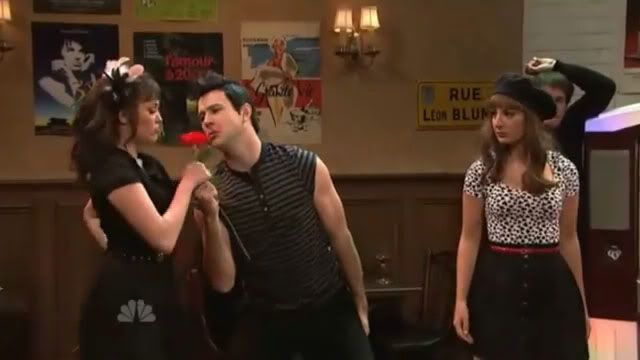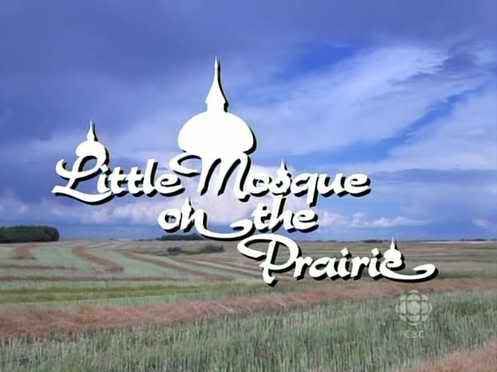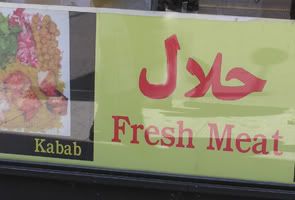 |
Bohemian who gyrates to Arabic Music
Saturday Night Live often gets it right with accents and idiosyncrasies, but goes its usual leftist direction when it melds politics into its skits. Recent skits featuring Hosni Mubarak are here and here - second link starts at 1:10 point - demonstrate this very well. The Arabic accent and mannerism is very good, as expected, so it is worth watching. Many skits are also over-sexualized - but SNL is an exaggerated version of what happens on regular TV, so that doesn't come as a surprise.
Miley Cyrus was recently on Saturday Night Live. She performs a skit on those bygone French Bohemians, with their romantic/decadent lifestyle, in what looks like the former artists' quarters in Montmartre (on which the basilica Sacré Coeur stands) in the northern region of Paris. Miley and another female are vying for the attention of the same man. SNL is reproducing the French New Wave of the 1950s and 1960s in this act, replete with berets and juke boxes. Yet, Miley gyrates anachronistically to music (1) infused with Arabic rhythm and melody, which had no place in the French popular culture of that era.
But SNL's writers are partly correct. The first of a large wave of Muslim Arabs inundated France in the mid-1950s and 1960s, as French leaders needed their labor to help build up the French economy. This evolved into an acculturation process, to make them as "French" as possible to complete the colonization mission. The ensuing decades saw masses of these North Africans arriving in France even after their economical usefulness had expired. To make matters worse, acculturation didn't work, either in France or back in Algeria, Morocco, Tunisia and elsewhere. Immigrants wanted the comforts and luxuries they could acquire in France, but they were not so willing to give up their culture and religion.
------------------------------------------------
 |
Stealth Islamic Inroads Into Our Culture
Kidist Paulos Asrat
Chronwatch.com, 07/24/2008
How Little Mosque on the Prairie Is Aiming at Our Souls
Kidist Paulos Asrat
Chronwatch.com, 12/12/2008
Burqa Prejudice
Kidist Paulos Asrat
Frontpage Magazine, 06/15/2010
------------------------------------------------
The following decades displayed a subtle Arabic influence on contemporary French (Parisian) culture, or more precisely, its common culture:
- Kebabs are common street eats, especially in the bohemian Latin Quarter
- The Barbés neighborhood, in the north of Paris (near Sacré Coeur, Montmartre and the famous Moulin Rouge), houses a large number of Arab Muslims
- Whole areas in Barbés are taken up by Muslims, who crouch on the pavements near over-flowing mosques to perform their Friday prayers in the open air, under the nervous presence of police
- It is not unusual to hear Arabic amidst the Parisian French
- There is a distinct Arab-French accent
- Television programs and popular artists combine some element of Arab culture into their acts
SNL is several years behind in detecting the infusion of Arabic culture into French society, but better late than never. We are all in this together. Muslims (and Islam) have an ambitious, Koran-mandated mission for the Ummah, or a world-wide community of Muslims under the Dar-al Islam (the House of Islam). Protesters and resisters are considered to be in Dar-al Harb, or the House of War, and any means, including violent Jihad, will be used to bring them (back) into the Islamic fold.
Seemingly innocuous steps to infuse the mainstream culture with Arabic and Islamic influences are:
- Selling Arabic food in mainstream venues, often following the Islamic dietary law Halal
- Introducing Arabic culture through the popular culture of movies, songs and television
- Muslims changing their attire and appearance - especially women, who are now showing up fully-covered (face included) publicly in the niqab
- I've also recently noticed Muslim men with long beards, dyed red with henna
- Using Arabic script and signs on shops
------------------------------------------------
 |
in downtown Toronto
------------------------------------------------
- Requiring special Islamic dietary considerations, i.e. Halal, in public institutions like schools and hospitals
- Mosques ubiquitously appearing in basements and ordinary buildings, with later ambitions of building full-blown mosques using Islamic architecture
SNL is following this prescription, at least in the popular culture category. This fits in perfectly with the peaceful cultural infusion that Muslims are counting on. Muslims really don't have to do anything. They just need to wait, occasionally violently injecting (almost reflexively) their world view, and let society do the rest of the work for them. Until, that is, they feel ready to propagate their own version of the Götterdämmerung, and destroy the world, already weakened by its own foolishness, in order to recreate a new world in the name (and face) of Islam.
------------------------------------------------
Reference:
(1). The song for the SNL skit - "Tekitoi" (T'es qui toi - Who are you?) is by Rachid Taha. Wikipedia says this about Taha:
Rachid Taha...is an Algerian singer. His music is influenced by many different styles such as rock, electronic, punk and raï..."Tekitoi" is a song from the CD of the same name Tekitoi. The CD is released by Wrasse Records, which:
Taha was born in Sig (Mascara Province), Algeria. His father was a factory worker. Taha's family immigrated to France in 1968...
His breakthrough album as a solo artist was Diwân [released in 1998], featuring remakes of songs for the Algerian and Arab traditions...
He covered The Clash song "Rock the Casbah" (in Arabic, as "Rock El Casbah"), which appeared in the 2007 film about Clash frontman Joe Strummer, The Future Is Unwritten...
Based in Paris where he began his solo career after his beginnings as the leader of the French rock band Carte de Séjour [Green Card], he usually sings in Arabic.
specializes in world music, with artists such as Fela Kuti, Rachid Taha, Ismael Lo, Souad Massi, Angélique Kidjo and Pink Martini.There is a much longer list of "world music" artists that Wrasse Records represent at the above Wikipedia link. But from the short list above, Souad Massi exemplifies the Algerian/North African diaspora in France, like Taha, which brings with it Arab music and culture and incorporates it into French culture, rather than the other way round.
Also, clearly it is not only the French who have a fascination for these exotic cultures. Wrasse Records (as in reggae's Rastafarians - referring to Ras Teferi?) is a British label and is run (and was founded) by the very British-looking couple Ian and Jo Ashbridge.

Ian and Jo Ashbridge of Wrasse Records
------------------------------------------------
Here is the song track for Rachid Taha's Tekitoi, (music samples at Amazon.com)
1. Tekitoi (Youtube link here for complete song)
2. Rock el Casbah
3. Li Fet Met
4. Hassbouhoum
5. Safi
6. Maftouh
7. Winta
8. Nahseb
9. Dima
10. Mamachi
11. Shuf
Note the incomprehensible Arabic words of all the titles. And there is a big difference between The Clash's "Rock the Casbah" which became
an unofficial anthem for U.S. forces during the first Gulf War, largely on the basis of the line about dropping "bombs between the minarets".and Taha's interpretation "Rock el Casbah" where he is voicing his gripe at his failed Algerian government, cleverly using a Punk Rock song. Perhaps he was simply using the song to help sell his CD.